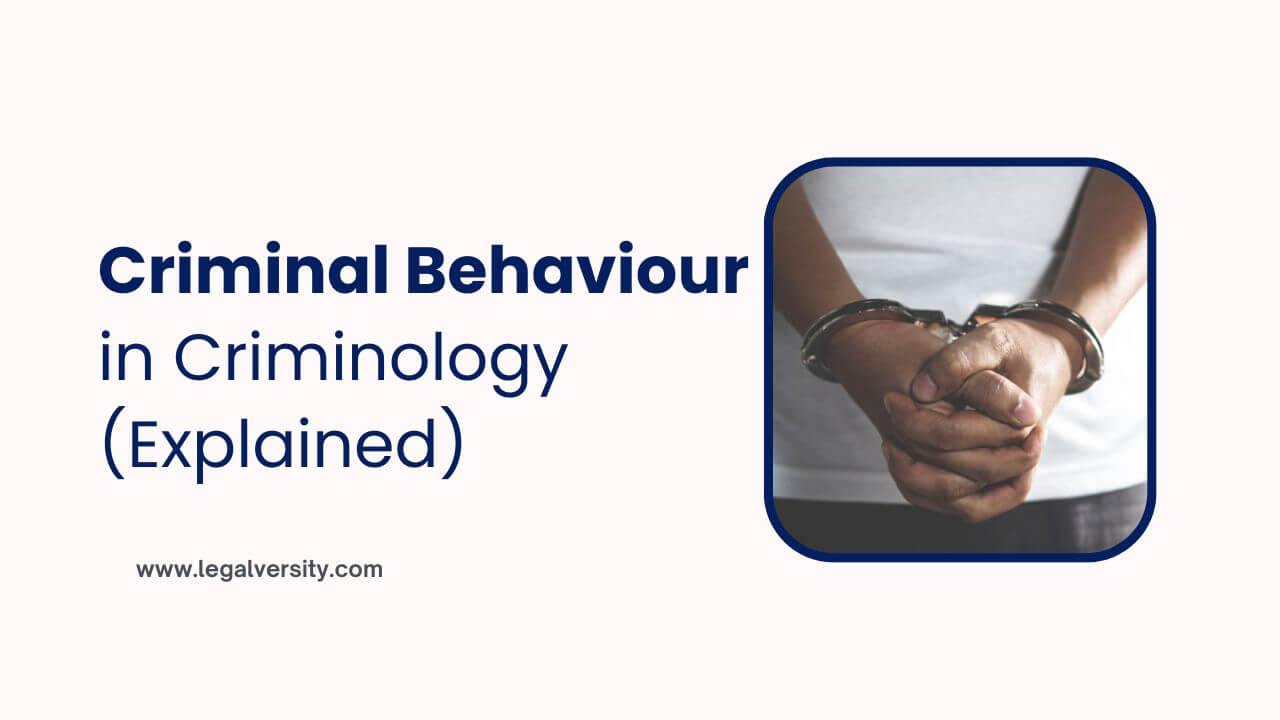There are four general definitions of criminal behaviour that will fit all the types of it. These four areas include the following types of act:
- Prohibited by law and are punished by the state.
- Considered to be violation moral or religious code and is believed to be punishable by a Supreme Spiritual being such as God.
- Violate norms of society or traditions and are believed to be punishable by community.
- Acts causing serious psychological stress or mental damage to a victim, but somewhat affordable for offender (referred as ’’Psychological criminal behaviour”)
Before going deep for understanding criminal behaviour first you should understand the concept of criminality.
Concept of Criminality
Criminality is a style of strategic behaviour characterised by self-contentedness,
indifference to the suffering and needs of others, and low self-control. More impulsive individuals are more likely to find criminality an attractive style of behaviour because it can provide immediate gratification through relatively easy or simple strategies.
Criminality is a certain personality profile that causes the most alarming sorts of crimes. All criminal behaviours involve the use of force, fraud, or stealth to obtain material or symbolic resources.
Criminal behaviour is the product of a systematic process that involves complex
interactions between individual, societal, and ecological factors over the course of our lives.
Now you know the concept of criminality its to understand the causes of criminal behaviour.
Causes of Criminal Behaviour
The reasons behind criminal behaviour can vary a lot in each particular case, but still
they can be grouped in two main categories genetics and environment.
When in the mid 19th century the question about the causes of criminal behaviour
was raised, a lot of psychologists were insisting that the only reason is genetics.
They even considered that a person’s inclination to criminal could be measured according to the parents mental condition, i.e. if they had some even minor mental problems theirs children was more likely to become a criminal.
Nowadays the psychologists and criminalists agree that what drives a person to
criminal behaviour is really complex and complicated mechanism, involving a lot of factors.
We can imagine a child, who was born in a “criminal” family (mother is schizophrenic, father is rapist and murderer) but after he got an education and a job there is nothing antisocial in his behaviours. It proves that solely genetics can’t determine one’s inclination to the criminal.
So, it is impossible to predict a person’s “criminality” according to some specific factors, but we can still highlight some circumstances and apply a person to a “relatively higher criminal risk group”.
- Financial problems, or starvation; this is especially common problem in third world countries. When a person has to struggle every day just to get food to survive, the probability that they become thieves is high.
- Low social status; when one is bullied because of it, they may easily become aggressors and fight back against the whole society.
- Genetics; some genetically mental disorders, itself, includes increased aggression.
Criminal behavior is the product of a systematic process that involves complex
interactions between individual, societal, and ecological factors over the course of our lives. In other words, from conception onward the intellectual, emotional, and physical attributes we develop are strongly influenced by our personal behaviours and physical processes, interactions with the physical environment, and interactions with other people, groups and institutions.
These systematic processes affect the transmission from generation to generation of traits associated with increased involvement in crime.
Traits of criminal behaviour
The following are the major traits of criminal behaviour Anti-social values:
This is also known as criminal thinking. It includes criminal rationalisation or the belief that their criminal behaviour was justified. Individuals possessing this trait often blame others for their negative behaviour, and show a lack of remorse.
Criminal Peers
Individuals with this trait often have peers that are associated with criminal activities.
Most are often involved with substance abuse including drugs or alcohol. Peer influence often persuades the individual to engage in criminal behaviour. They will also typically present with a lack of pro-social community involvement.
These traits often include atypical behaviour conducted prior to the age of fifteen and can include, running away, skipping school, fighting, possessing weapons, lying, stealing and damage to either animals or property.
Dysfunctional family
One of the most common traits includes a lack of family support, both emotionally and otherwise. An individual’s family lacks the ability to problem solve and often is unable to communicate effectively. Family members often don’t possess the ability to express emotions in an appropriate manner. More often than not, they are also involved with criminal activity.
Low self-control
This involves one’s ability to control temperament and impulsivity. People that carry this trait often do things that they didn’t plan, and will fail to think before acting. The mindset is of the here and now, and not on the consequences of the behaviour.
Substance abuse
The use of drugs or alcohol that significantly affect one’s ability to engage in a
successful and productive lifestyle. There is often an increased tolerance to substances, in addition to an inability to stop use.
See these as well:

